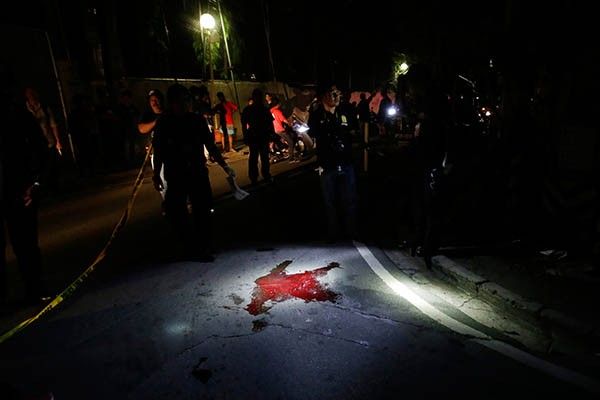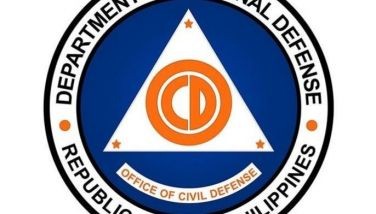US raises 'significant concerns' over impunity, sharp rise in EJKs in Philippines
March 5, 2017 | 12:48pm

In this Sept. 5, 2016 photo, police inspect the site where alleged drug user Marcelo Salvador was shot dead by unidentified men in Las Pinas, south of Manila, Philippines. Drug dealers and drug addicts, were being shot by police or slain by unidentified gunmen in mysterious, gangland-style murders that were taking place at night. Salvador became a victim, the casualty of a vicious war on drugs that has claimed thousands of lives as part of a campaign by Philippine President Rodrigo Duterte.
AP Photo / Aaron Favila
MANILA, Philippines — Concerns about police impunity rose significantly as extrajudicial killings (EJKs) swell in startling numbers in the Philippines, a US State Department report on human rights noted.
The report, released on March 3 (Washington DC time), traced the worries to the few administrative or criminal charges filed against Philippine National Police (PNP) officers despite the sharp increase in police killings. It also noted President Rodrigo Duterte's vocal rejection of criticisms on the killings.
"President Duterte campaigned on a platform against crime, specifically the widespread trafficking and abuse of illegal narcotics, which included numerous public statements suggesting that killing suspected drug traffickers and users was necessary to meet his goal of wiping out drug-related crime within three to six months of assuming office," the US State Department's "Country Reports on Human Rights Practices for 2016" said regarding the Philippines.
"The government investigated a limited number of reported human rights abuses, including abuses by its own forces, paramilitaries, and insurgent and terrorist groups... Significant concerns about impunity of civilian national and local government officials and powerful business and commercial figures persisted."
The report covers the state of human rights in individual countries.
It said extrajudicial killings remain the chief human rights concern in the Philippines, where a sharp increase was recorded over the past year. Over 7,000 suspected drug dealers and users have been killed since the Duterte administration launched its bloody war on drugs.
As of August last year, the Commission on Human Rights (CHR) investigated 227 new complaints of extrajudicial and politically motivated killings. The CHR suspected that Philippine National Police (PNP) and Philippine Drug Enforcement Agency—agencies involved in the anti-drug campaign—personnel were involved in 112 of the complaints.
Human Rights Watch has recently released a report pointing out police involvement in vigilante killings of drug suspects.
The PNP is required by law to conduct an internal investigation of injuries and deaths resulting from operations, but the US State Department said no police officer faced charges as a result of the probe.
"Between January 1 and September 26, the PNP Internal Affairs Service opened 709 internal investigations into the 940 PNP killings reported in that period. As of late September, no administrative or criminal charges against PNP officers had resulted from the investigations."
The PNP Internal Affairs Service, meanwhile, asserted that all deaths in police shootings resulted from legitimate operations.
'Chilling effect'
The report also noted contradictions in the statements made by Duterte regarding the killings. Although Duterte assured the public that his administration would never tolerate extrajudicial killings and ordered the police to follow the law, he had also made a vow that cops involved in drug killings would be immune from investigation and prosecution.
Duterte had gained notoriety for his word wars with critics concerned about human rights violations in his drug war. The US State Department said his retaliation "had a chilling effect on free speech and expression."
Duterte had lashed out at former US President Barack Obama, telling the latter to go to hell at one point after criticisms on his crackdown.
Washington-based think tank Center for Strategic and International Studies said Duterte has softened his stance against the United States when US President Donald Trump took office. Trump has expressed support for Duterte's drug war.
Trump's Secretary of State Rex Tillerson, however, was criticized for his absence during the release of the report—a departure from past practice. Rights groups claimed that his action was a departure from the US' outspoken advocacy for human rights. They also noted that Tillerson has never spoken publicly about human rights since he took office a month ago.
Trump, himself, is being questioned over his commitment to human rights due to policies against refugees and citizens from predominantly Muslim countries.
Malacañang: EJKs 'unlawful'
Malacañang in a reaction to the report said the government's war on narcotics is an urgent and critical domestic matter but urged the international community for support.
Presidential spokesman Ernesto Abella on Saturday added that the Duterte administration is firmly committed to upholding human rights.
"Vigilante or extrajudicial killings are unlawful and are therefore not sanctioned. The government condemns such practice."
BrandSpace Articles
<
>
Philstar
x
- Latest
- Trending
Trending
Latest
Trending
Latest
Recommended


























